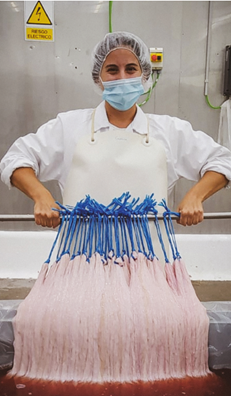It's all about people
Van Hessen holds several values in high regard: People, Passion, Mastery, Entrepreneurship, Reliability, and “It all matters.” In this edition of Let’s Meat, we highlight one: People matter! We asked Sandra Floor, HR specialist in the area of Learning & Development, about the importance of people for Van Hessen.

Sandra, what exactly do you do with Van Hessen?
“What do I do? Making sure that the right people are in the right place. That is my passion! I believe I have the best job. When I started to work with Van Hessen about a year and a half ago, the communication of our core values needed a boost. This is called employer branding; it is telling people that it is good working at Van Hessen and that the company is a kind of best-kept secret.”
“Our sector is a specialism; the work we do is not your everyday business. That is why recruiting as well as retaining people is very important for us. Besides that, Van Hessen is growing and then you increasingly need specialized people in more and more places. They all have to work according to the same standard. That’s why we’re aiming for the future. It’s called succession planning. The idea is that in twenty years, there will be professionals at all levels and at every branch of our company who will be able to continue to work out of the same vision and passion for quality.”
There was a need for a good recruitment strategy. What exactly did Van Hessen do to make this possible and how exactly did this work out for trainees?
“We started recruiting candidates from various target groups for a special training program that Van Hessen has been running for years. At the same time, we have started to connect people within the company. We continually attempt to have people from different cultures work with one another to minimize the differences in standards and to develop one company culture and to exchange knowledge. This way we globally build the DNA of the organization.”
“Next to this cross-cultural connection we also bring employees from different management levels in contact with each other. Trainees should not only know the gutroom well but also be able to comprehend the art of selection. They also need to understand the needs of customers, e.g. which casings are needed for which sausage. Knowledge-sharing does not only happen horizontally but also from the bottom up. You cannot lead at Van Hessen without a thorough knowledge of all processes. This way, also those that do the daily work in production have a voice that counts.
You’re talking about trainees. Could you say something more? Are you referring to a kind of internship?
“You may forget about the idea of an internship. We realized that there isn’t any education available that covers all aspects of the work in our industry. That’s why we developed the traineeship. And that isn’t an internship! We always say to our trainees: ‘You are being paid to learn; you receive a salary to gain knowledge.’” “The traineeship knows three important aspects. In the first place, it is truly international. Already after a few weeks, a trainee jumps on a plane to master processes elsewhere and to discover different cultural approaches. Secondly, the guidance is excellent. A trainee has a tutor who provides tactical and operational advice every week and to whom the trainee needs to report. There is also a mentor for the more strategic aspect. And don’t forget the support from HR. We are closely involved in guiding our trainees. After all, we were involved in their recruitment.” “The third aspect of the traineeship is quite innovative. We want to hear the opinion of the young talent we have recruited ourselves. In the beginning they think this is strange but how else will they start to think for themselves? By actively teaching them to always ask the ‘why-question’ we stimulate them to think analytically and to keep learning but also to make the organization stronger.”
Why is this analytical ability so important?
“Simply because management cannot be detached from all the specialisms in our industry. There are various fields of expertise and all kinds of markets. Our organization has an international character and in every country things are done differently. On the one hand, this is caused by cultural differences, on the other because each market has its specific requirements. In short, there are many aspects involved. Our trainees need to be able to make connections that one would normally overlook. They need to develop sensitivity for other cultures, become acquainted with all kinds of techniques, and acquire insight into various disciplines. And then there’s the task of integrating all these things. For that, you need analytical skills.”
You invest a lot of energy in people. How does Van Hessen ensure that these people stay?
“The current generation of young talent wants to be able to contribute. To be able to add something to the whole, that’s where they find satisfaction and self-worth. With Van Hessen this is possible. Van Hessen allows you to grow within the company. Naturally, this needs to take place within a certain framework but there are many opportunities. Our people-oriented approach has translated itself in the traineeship in a natural way. As a result, the energy that we invest in people causes them to want to stay.”
--------
Let’s Meat managed to get a hold
of Rocío Sánchez, a trainee in
Spain, to ask her a few questions.

Is your experience with Van Hessen different from what you expected?
“Oh, absolutely,” laughs Rocío, “It was completely different in a positive sense. I expected a kind of paid internship in which I would be working in just one location. However, when I started with Van Hessen, very soon I found myself visiting other locations. I didn’t see that coming. It is quite a bit different from what you’d expect when you hear the word trainee whether in Spain, or anywhere else for that matter. Van Hessen is challenging as you get to work at all organizational levels and get asked to give your opinion.”
What do you do as a trainee?
“Every trainee develops knowledge and skills that are needed to fulfill a key position in the organization. To get there, you need to know everything about products and processes. Besides, you learn by doing. From the big picture, you move to the smallest detail. This past year I have been working primarily in the gutroom. It is a lively environment in which no day is the same.”
What is your experience with the Van Hessen culture?
“The culture is quite special actually. It’s all about relationships here. People help one another and share knowledge. They take the time for you and ask for your opinion from the beginning. They want you to be your best because in the end, that benefits the company. I cannot think of a better work environment.”